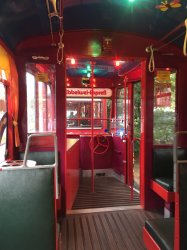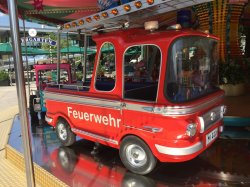You are using an out of date browser. It may not display this or other websites correctly.
You should upgrade or use an alternative browser.
You should upgrade or use an alternative browser.
Train or plane in Germany
- Thread starter melon126
- Start date
- Status
- Not open for further replies.
OZDUCK
Established Member
- Joined
- Aug 1, 2010
- Posts
- 4,703
This is a worth while Tram ride in GERMANY!
We only did the ride up/down from the Castle. Obviously missed out on a nice trip on the second part.
Read our AFF credit card guides and start earning more points now.
AFF Supporters can remove this and all advertisements
Anna
Established Member
- Joined
- Jan 17, 2005
- Posts
- 3,345
One benefit with travelling 1st class DBahn is you get free entry into their 1st class alone.
Tried to access the DB lounge in Köln yesterday and was told that access is not available to anyone holding any kind of rail pass whether it is Eurail, German Rail Pass or whatever.
My first train trip using the pass had me slightly alarmed when I realised that one of the handful of other pax in the F carriage had mental health issues and wouldn't stop talking to himself. Ironically he seemed to be rehearsing what he would say when he was asked for his ticket, as he didn't have one. I moved to the next carriage as I didn't feel comfortable, so that was a waste of the 5,90 seat reservation fee! So the next train I didn't bother paying for an assigned seat but it was so crammed I had to get off and wait for another one that had some space as I didn't want to stand for an hour between Köln and Frankfurt. I will get the hang of this eventually.......
Tried to access the DB lounge in Köln yesterday and was told that access is not available to anyone holding any kind of rail pass whether it is Eurail, German Rail Pass or whatever.
My first train trip using the pass had me slightly alarmed when I realised that one of the handful of other pax in the F carriage had mental health issues and wouldn't stop talking to himself. Ironically he seemed to be rehearsing what he would say when he was asked for his ticket, as he didn't have one. I moved to the next carriage as I didn't feel comfortable, so that was a waste of the 5,90 seat reservation fee! So the next train I didn't bother paying for an assigned seat but it was so crammed I had to get off and wait for another one that had some space as I didn't want to stand for an hour between Köln and Frankfurt. I will get the hang of this eventually.......
That sounds odd (most of the 1st but of your post...).
I would ask at an info booth and say you hold a 1st class rail pass so can you access the lounges as it is equivalent to unlimited 1st class tickets?
Do the T&Cs say anything about not providing access?
Anna
Established Member
- Joined
- Jan 17, 2005
- Posts
- 3,345
Some things I've noticed that might be useful for people to know.
Buying a rail pass in advance saves money. I paid 310 euros for 5 separate days of unlimited F travel. By contrast if I'd arrived at Köln station to buy an F ticket for the next departure to Frankfurt last Sunday, it would have cost me 127 euros just for the 1 hour, one way journey.
The bistro on board a DB train charges approx double what you would spend if you bought food or drinks at one of the numerous stalls that are in all except the smallest suburban stations. I would expect to pay 1-1.5 euros for a cup of tea on the platform but it's 3.20 on board.
There's no large luggage racks on most ICE trains, only the overhead racks. The place for larger bags is in the middle of the F carriage where the seats face opposite directions. Between the backs of the 2 rows of opposite-facing seats there is space to stow larger bags.
As to luggage, unlike the ease of a Swiss train where you just roll your bag on as the carriage level and platform level are the same, on a DB train you'll have to lift your bag onboard. It might be about 20cm or it might be higher, depending on the kind of train. If it's an Italian train it'll seem about a metre .
.
Unless you're very determined and organised, forget about using public transport like bus or underground to get to the train station if you have luggage. Like in Paris you will encounter endless stairs. Some stations have lifts or escalators, but not at every entrance and not always working. Again the Swiss do this so much better than the Germans.
Just like there can be gate changes with air travel, there can be platform changes with DB trains and they may not be announced clearly in English. I was waiting for a train from Frankfurt to Berlin. First there was an announcement of a 15 minute delay. Then right on the scheduled departure time there was an announcement of a platform change, which caused a headlong stampede of pax and bags as everyone thought there was no delay any more and panicked about getting to the new platform in time. I did not hear either announcement in English. Luckily I can remember enough university German to understand what was going on. (Bet I can't write an essay in German about German literary romanticism any more though ).
).
There can be compensation for some sorts of tickets if the train is late and you miss a connection. Again they don't announce that in English. My train left Frankfurt late but made up the time en route and arrived in Berlin on schedule.
If you reserve a seat at the DB service centre you can ask for a seat facing the direction of travel but it doesn't always work. At Frankfurt for example, the trains enter in one direction but leave 'backwards' so what's facing the direction of travel into Frankfurt will become the reverse on the continued journey.
Don't trust the DB service centre for accurate info about when the next train is. They seem to have cut-off times, and if there is a train in the next 5-10 mins you could still catch it but they don't tell you about it, probably because their computer isn't showing it. Check the departure boards instead.
There's not always good views from a train. There's lots of tunnels, cuttings and hedges/trees/screening around the tracks that can stop you seeing very much at all. Like cloud cover on a flight I guess.
Moving on the high speed trains is surprisingly difficult. It's much harder to keep your balance than on a suburban train, a plane or even on a ship in a gale. If you have balance or mobility problems I'd recommend sitting still until the train stops.
Many trains are going to the popular destination Nichteinsteigen or its near neighbour Bittenichteinsteigen. Don't get on these .
.
If there's a spare seat on the platform that is both clean and in the shade, it's going to be right next to the Raucherbereich (smoking area) .
.
And to end on a sweet note, DB hand out little heart-shaped shortbread biscuits in F
Buying a rail pass in advance saves money. I paid 310 euros for 5 separate days of unlimited F travel. By contrast if I'd arrived at Köln station to buy an F ticket for the next departure to Frankfurt last Sunday, it would have cost me 127 euros just for the 1 hour, one way journey.
The bistro on board a DB train charges approx double what you would spend if you bought food or drinks at one of the numerous stalls that are in all except the smallest suburban stations. I would expect to pay 1-1.5 euros for a cup of tea on the platform but it's 3.20 on board.
There's no large luggage racks on most ICE trains, only the overhead racks. The place for larger bags is in the middle of the F carriage where the seats face opposite directions. Between the backs of the 2 rows of opposite-facing seats there is space to stow larger bags.
As to luggage, unlike the ease of a Swiss train where you just roll your bag on as the carriage level and platform level are the same, on a DB train you'll have to lift your bag onboard. It might be about 20cm or it might be higher, depending on the kind of train. If it's an Italian train it'll seem about a metre
Unless you're very determined and organised, forget about using public transport like bus or underground to get to the train station if you have luggage. Like in Paris you will encounter endless stairs. Some stations have lifts or escalators, but not at every entrance and not always working. Again the Swiss do this so much better than the Germans.
Just like there can be gate changes with air travel, there can be platform changes with DB trains and they may not be announced clearly in English. I was waiting for a train from Frankfurt to Berlin. First there was an announcement of a 15 minute delay. Then right on the scheduled departure time there was an announcement of a platform change, which caused a headlong stampede of pax and bags as everyone thought there was no delay any more and panicked about getting to the new platform in time. I did not hear either announcement in English. Luckily I can remember enough university German to understand what was going on. (Bet I can't write an essay in German about German literary romanticism any more though
There can be compensation for some sorts of tickets if the train is late and you miss a connection. Again they don't announce that in English. My train left Frankfurt late but made up the time en route and arrived in Berlin on schedule.
If you reserve a seat at the DB service centre you can ask for a seat facing the direction of travel but it doesn't always work. At Frankfurt for example, the trains enter in one direction but leave 'backwards' so what's facing the direction of travel into Frankfurt will become the reverse on the continued journey.
Don't trust the DB service centre for accurate info about when the next train is. They seem to have cut-off times, and if there is a train in the next 5-10 mins you could still catch it but they don't tell you about it, probably because their computer isn't showing it. Check the departure boards instead.
There's not always good views from a train. There's lots of tunnels, cuttings and hedges/trees/screening around the tracks that can stop you seeing very much at all. Like cloud cover on a flight I guess.
Moving on the high speed trains is surprisingly difficult. It's much harder to keep your balance than on a suburban train, a plane or even on a ship in a gale. If you have balance or mobility problems I'd recommend sitting still until the train stops.
Many trains are going to the popular destination Nichteinsteigen or its near neighbour Bittenichteinsteigen. Don't get on these
If there's a spare seat on the platform that is both clean and in the shade, it's going to be right next to the Raucherbereich (smoking area)
And to end on a sweet note, DB hand out little heart-shaped shortbread biscuits in F
lovetravellingoz
Enthusiast
- Joined
- Jul 13, 2006
- Posts
- 12,743
Some things I've noticed that might be useful for people to know.
Buying a rail pass in advance saves money. I paid 310 euros for 5 separate days of unlimited F travel. By contrast if I'd arrived at Köln station to buy an F ticket for the next departure to Frankfurt last Sunday, it would have cost me 127 euros just for the 1 hour, one way journey.
True.
However in Germany, and much of Europe, if you can lock in when you will travel by train and buy in advance one can often travel very cheaply. F can often be little more than discount economy as well.
Passes come into their own when you do not want to be locked in advance.
Anna
Established Member
- Joined
- Jan 17, 2005
- Posts
- 3,345
"Ladies and gentlemen, you are today on ice" 
Meaning the train type ICE, obvs.
The good bit is I'm communicating from the train using the wifi, and I have a seat reservation so I'm not one of the people sitting on the floor.
The bad bit is that I should have taken my own advice about not using public transport to get to the main train station. I left the hotel 90 mins ahead of the train departure, waited 10 mins for the bus, arrived at Bahnhof Zoo. Next train to Hauptbahnhof in 5 mins - missed that one trying to find the lift to the platform, couldn't find it amongst all the renovation hoardings and had to lug a 20 kg bag up steps but too late, that train was gone. No S-Bahn running this week due to renovations so that's not an alternative. Next train in 25 mins, which would still give me 20-25 mins to get the train to Munich. But no, after waiting nearly 20 mins there's an announcement in German that the next train is running 10 mins late. So I give up and get a cab. It sails back past the hotel on the way to the Hauptbahnhof. It costs 14 euros, annoying because I had 2 other tickets that entitled me to public transport today. Find the correct platform at the Hauptbahnhof - amazingly there's no food or drink stalls anywhere nearby except one with a mile long queue and I'm not prepared to risk it. So now I'm on a 4.5 hour journey at the mercy of the onboard prices. Sigh. (And they've just announced no hot drinks available today, only cold drinks, and I was really looking forward to relaxing with a cup of tea once onboard). On the platform there's riot police in full gear. I find out why when the next train arrives and it's full of what I assume are football fans, about 60 of them, who proceed off the train and up to the exit chanting loudly, swigging beer at 9.30am and waving their arms in the air in what look disturbingly like naz_ salutes. Then the Munich train is announced to be 5 mins late. Sigh again. When it pulls in there's a mad rush and I get pushed onto the train causing me to stumble and bruise my shin against the step. It's already blue so it's going to be a fantastic one.
I've got an aisle seat but the window wouldn't have been any use for looking out cos it's covered in blue, green and red spray paint. Not sure if it's graffiti or advertising.
Travelling by train in Switzerland was nothing like this!
Right now my answer to the question 'plane or train in Germany' is PLANE

Meaning the train type ICE, obvs.
The good bit is I'm communicating from the train using the wifi, and I have a seat reservation so I'm not one of the people sitting on the floor.
The bad bit is that I should have taken my own advice about not using public transport to get to the main train station. I left the hotel 90 mins ahead of the train departure, waited 10 mins for the bus, arrived at Bahnhof Zoo. Next train to Hauptbahnhof in 5 mins - missed that one trying to find the lift to the platform, couldn't find it amongst all the renovation hoardings and had to lug a 20 kg bag up steps but too late, that train was gone. No S-Bahn running this week due to renovations so that's not an alternative. Next train in 25 mins, which would still give me 20-25 mins to get the train to Munich. But no, after waiting nearly 20 mins there's an announcement in German that the next train is running 10 mins late. So I give up and get a cab. It sails back past the hotel on the way to the Hauptbahnhof. It costs 14 euros, annoying because I had 2 other tickets that entitled me to public transport today. Find the correct platform at the Hauptbahnhof - amazingly there's no food or drink stalls anywhere nearby except one with a mile long queue and I'm not prepared to risk it. So now I'm on a 4.5 hour journey at the mercy of the onboard prices. Sigh. (And they've just announced no hot drinks available today, only cold drinks, and I was really looking forward to relaxing with a cup of tea once onboard). On the platform there's riot police in full gear. I find out why when the next train arrives and it's full of what I assume are football fans, about 60 of them, who proceed off the train and up to the exit chanting loudly, swigging beer at 9.30am and waving their arms in the air in what look disturbingly like naz_ salutes. Then the Munich train is announced to be 5 mins late. Sigh again. When it pulls in there's a mad rush and I get pushed onto the train causing me to stumble and bruise my shin against the step. It's already blue so it's going to be a fantastic one.
I've got an aisle seat but the window wouldn't have been any use for looking out cos it's covered in blue, green and red spray paint. Not sure if it's graffiti or advertising.
Travelling by train in Switzerland was nothing like this!
Right now my answer to the question 'plane or train in Germany' is PLANE
- Joined
- Jan 29, 2012
- Posts
- 15,995
- Qantas
- LT Gold
- Virgin
- Red
- Oneworld
- Emerald
Dear oh dear. You are not having a good run.
- Joined
- Jan 29, 2012
- Posts
- 15,995
- Qantas
- LT Gold
- Virgin
- Red
- Oneworld
- Emerald
The pink one behind it looked cute.View attachment 132835 I didn't ride on the one but I was tempted
Anna
Established Member
- Joined
- Jan 17, 2005
- Posts
- 3,345
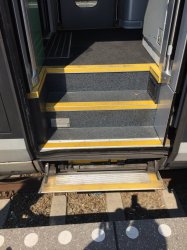 These are a good example of the steps you have to contend with when boarding a German train. As you can see, narrow and steep, which = awkward with luggage. You can also see that shadow rushing in from the left - I was lucky to get a shot at all, because people behave like crazed lunatics when it comes to trying to board a train here. It's like they think the doors are going to shut on them regardless of whether everyone has boarded or not.
These are a good example of the steps you have to contend with when boarding a German train. As you can see, narrow and steep, which = awkward with luggage. You can also see that shadow rushing in from the left - I was lucky to get a shot at all, because people behave like crazed lunatics when it comes to trying to board a train here. It's like they think the doors are going to shut on them regardless of whether everyone has boarded or not.Anna
Established Member
- Joined
- Jan 17, 2005
- Posts
- 3,345
Some shots of what F generally looks like from my trip from Munich to Salzburg today. On the return I was in a compartment shared with a couple so didn't want to photograph it. I've used up my rail pass now so that's me done.
Can't beat the romance of being on a train that's continuing on to somewhere exotic like Budapest. Shame the German trains are so luggage-unfriendly.
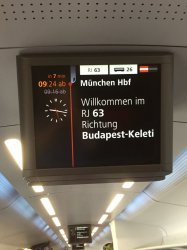
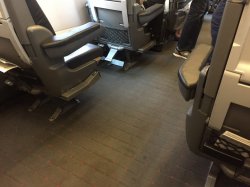
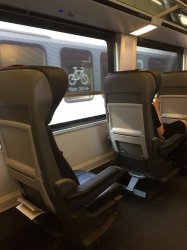
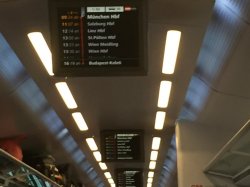
Can't beat the romance of being on a train that's continuing on to somewhere exotic like Budapest. Shame the German trains are so luggage-unfriendly.




- Status
- Not open for further replies.
Become an AFF member!
Join Australian Frequent Flyer (AFF) for free and unlock insider tips, exclusive deals, and global meetups with 65,000+ frequent flyers.AFF members can also access our Frequent Flyer Training courses, and upgrade to Fast-track your way to expert traveller status and unlock even more exclusive discounts!

AFF forum abbreviations
Wondering about Y, J or any of the other abbreviations used on our forum?Check out our guide to common AFF acronyms & abbreviations.









